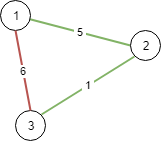There are N cities numbered from 1 to N.
You are given connections, where each connections[i] = [city1, city2, cost] represents the cost to connect city1 and city2 together. (A connection is bidirectional: connecting city1 and city2 is the same as connecting city2 and city1.)
Return the minimum cost so that for every pair of cities, there exists a path of connections (possibly of length 1) that connects those two cities together. The cost is the sum of the connection costs used. If the task is impossible, return -1.
Example 1:
Input: N = 3, connections = [[1,2,5],[1,3,6],[2,3,1]] Output: 6 Explanation: Choosing any 2 edges will connect all cities so we choose the minimum 2.
Example 2:
Input: N = 4, connections = [[1,2,3],[3,4,4]] Output: -1 Explanation: There is no way to connect all cities even if all edges are used.
Note:
1 <= N <= 100001 <= connections.length <= 100001 <= connections[i][0], connections[i][1] <= N0 <= connections[i][2] <= 10^5connections[i][0] != connections[i][1]
class Solution:
def minimumCost(self, n: int, connections: List[List[int]]) -> int:
p = list(range(n))
connections.sort(key=lambda x: x[2])
res = 0
def find(x):
if p[x] != x:
p[x] = find(p[x])
return p[x]
def union(a, b):
pa, pb = find(a - 1), find(b - 1)
if pa == pb:
return False
p[pa] = pb
return True
for c1, c2, cost in connections:
if union(c1, c2):
n -= 1
res += cost
if n == 1:
return res
return -1class Solution {
private int[] p;
public int minimumCost(int n, int[][] connections) {
p = new int[n];
for (int i = 0; i < n; ++i) {
p[i] = i;
}
Arrays.sort(connections, (a, b) -> a[2] - b[2]);
int res = 0;
for (int[] e : connections) {
if (union(e[0], e[1])) {
res += e[2];
--n;
if (n == 1) {
return res;
}
}
}
return -1;
}
private int find(int x) {
if (p[x] != x) {
p[x] = find(p[x]);
}
return p[x];
}
private boolean union(int a, int b) {
int pa = find(a - 1), pb = find(b - 1);
if (pa == pb) {
return false;
}
p[pa] = pb;
return true;
}
}class Solution {
public:
vector<int> p;
int minimumCost(int n, vector<vector<int>> &connections) {
p.resize(n);
for (int i = 0; i < n; ++i) p[i] = i;
auto cmp = [](auto &a, auto &b)
{
return a[2] < b[2];
};
sort(connections.begin(), connections.end(), cmp);
int res = 0;
for (auto e : connections)
{
if (unite(e[0], e[1]))
{
res += e[2];
--n;
if (n == 1) return res;
}
}
return -1;
}
int find(int x) {
if (p[x] != x) p[x] = find(p[x]);
return p[x];
}
bool unite(int a, int b) {
int pa = find(a - 1), pb = find(b - 1);
if (pa == pb) return false;
p[pa] = pb;
return true;
}
};var p []int
func minimumCost(n int, connections [][]int) int {
p = make([]int, n)
for i := 0; i < len(p); i++ {
p[i] = i
}
sort.Slice(connections, func(i, j int) bool {
return connections[i][2] < connections[j][2]
})
res := 0
for _, e := range connections {
if union(e[0], e[1]) {
res += e[2]
n--
if n == 1 {
return res
}
}
}
return -1
}
func find(x int) int {
if p[x] != x {
p[x] = find(p[x])
}
return p[x]
}
func union(a, b int) bool {
pa, pb := find(a-1), find(b-1)
if pa == pb {
return false
}
p[pa] = pb
return true
}

